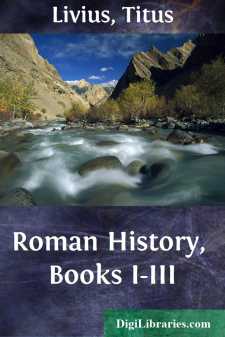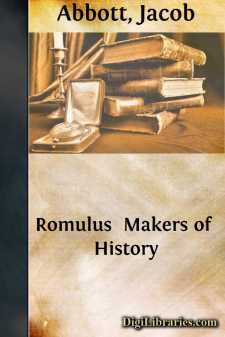History
- Africa 30
- Americas (North Central South West Indies) 50
- Ancient
- Asia 58
- Australia & New Zealand 8
- Canada 41
- Caribbean & West Indies 1
- Civilization 20
- Eastern Europe 12
- Europe 310
- Expeditions & Discoveries 60
- General 77
- Historical Geography 1
- Jewish 9
- Latin America 3
- Medieval 8
- Middle East 14
- Military 248
- Revolutionary 8
- Study & Teaching 5
- United States 353
- Western Europe 56
- World 13
Ancient Books
Sort by:
by:
Titus Livius
LIVY'S ROMAN HISTORY BOOK I[1] THE PERIOD OF THE KINGS To begin with, it is generally admitted that, after the taking of Troy, while all the other Trojans were treated with severity, in the case of two, Æneas and Antenor, the Greeks forbore to exercise the full rights of war, both on account of an ancient tie of hospitality, and because they had persistently recommended peace and the restoration...
more...
CHAPTER I. A ROMAN BOY. A Roman father's first duty to his boy, after lifting him up in his arms in token that he was a true son of the house, was to furnish him with a first name out of the scanty list (just seventeen) to which his choice was limited. This naming was done on the eighth day after birth, and was accompanied with some religious ceremonies, and with a feast to which kinsfolk were...
more...
by:
Jacob Abbott
CADMUS. B.C. 1500Different kinds of greatness.Some men are renowned in history on account of the extraordinary powers and capacities which they exhibited in the course of their career, or the intrinsic greatness of the deeds which they performed. Others, without having really achieved any thing in itself very great or wonderful, have become widely known to mankind by reason of the vast consequences...
more...
CHAPTER I. ~~ THE STORY OF ROMULUS AND OF NUMA. Æneas of Troy, coming to the land of Italy, took to wife Lavinia, daughter of King Latinus, and built him a city, which he called Lavinium, after the name of his wife. And, after thirty years, his son Ascanius went forth from Lavinium with much people, and built him a new city, which he called Alba. In this city reigned kings of the house and lineage of...
more...
by:
John Wilson Ross
CHAPTER I. TACITUS COULD BARELY HAVE WRITTEN THE ANNALS. I. From the chronological point of view.—II. The silence preserved about that work by all writers till the fifteenth century.—III. The age of the MSS. containing the Annals. I. The Annals and the History of Tacitus are like two houses in ruins: dismantled of their original proportions they perpetuate the splendour of Roman historiography, as...
more...
INTRODUCTION Tacitus held the consulship under Nerva in the year 97. At this point he closed his public career. He had reached the goal of a politician's ambition and had become known as one of the best speakers of his time, but he seems to have realized that under the Principate politics was a dull farce, and that oratory was of little value in a time of peace and strong government. The rest of...
more...
THE CÆSARS. The condition of the Roman Emperors has never yet been fully appreciated; nor has it been sufficiently perceived in what respects it was absolutely unique. There was but one Rome: no other city, as we are satisfied by the collation of many facts, either of ancient or modern times, has ever rivalled this astonishing metropolis in the grandeur of magnitude; and not many—if we except the...
more...
by:
Isaac Newton
CHAP. I. Of the Chronology of the First Ages of the Greeks. All Nations, before they began to keep exact accounts of Time, have been prone to raise their Antiquities; and this humour has been promoted, by the Contentions between Nations about their Originals. Herodotus tells us, that the Priests ofEgyptreckoned from the Reign ofMenesto that ofSethon, who putSennacheribto flight, three hundred forty and...
more...
by:
Herodotus
PREFACE If a new translation of Herodotus does not justify itself, it will hardly be justified in a preface; therefore the question whether it was needed may be left here without discussion. The aim of the translator has been above all things faithfulness—faithfulness to the manner of expression and to the structure of sentences, as well as to the meaning of the Author. At the same time it is...
more...
by:
Herodotus
BOOK V. THE FIFTH BOOK OF THE HISTORIES, CALLED TERPSICHORE 1. In the meantime those of the Persians who had been left behind in Europe by Dareios, of whom Megabazos was the commander, had subdued the people of Perinthos first of the Hellespontians, since they refused to be subject to Dareios. These had in former times also been hardly dealt with by the Paionians: for the Paionians from the Strymon had...
more...











